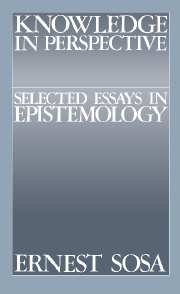Book contents
- Frontmatter
- Contents
- Sources and acknowledgments
- Introduction: back to basics
- PART I WHAT IS KNOWLEDGE, AND HOW IS IT POSSIBLE?
- PART II THEORIES OF JUSTIFICATION
- PART III INTELLECTUAL VIRTUE AND EPISTEMIC PERSPECTIVE: A VIEW PRESENTED
- PART IV INTELLECTUAL VIRTUE IN PERSPECTIVE: THE VIEW DEVELOPED
- 13 Knowledge and intellectual virtue
- 14 Methodology and apt belief
- 15 Equilibrium in coherence?
- 16 Intellectual virtue in perspective
- Index
14 - Methodology and apt belief
Published online by Cambridge University Press: 08 January 2010
- Frontmatter
- Contents
- Sources and acknowledgments
- Introduction: back to basics
- PART I WHAT IS KNOWLEDGE, AND HOW IS IT POSSIBLE?
- PART II THEORIES OF JUSTIFICATION
- PART III INTELLECTUAL VIRTUE AND EPISTEMIC PERSPECTIVE: A VIEW PRESENTED
- PART IV INTELLECTUAL VIRTUE IN PERSPECTIVE: THE VIEW DEVELOPED
- 13 Knowledge and intellectual virtue
- 14 Methodology and apt belief
- 15 Equilibrium in coherence?
- 16 Intellectual virtue in perspective
- Index
Summary
The theory of knowledge has two sides — epistemology and methodology — and a bridge to join them: that a belief is justified if and only if obtained by appropriate use of an adequate organon — a principle of theoretical epistemology requiring an organon or manual of practical methodology. Such organon justification is internalist. (How could one ever miss one's source for it?) But it leads briskly to skepticism on pain of regress or circularity — or so it is argued in Section 1. In Section 2 we consider the epistemology embodied in the Socratic elenchus, which provides a new angle on how methodology relates to epistemology and to science and metaphysics. Thus are we made to face once again the organon account of justification: our internalist bridge principle. That account proves in Section 3 to be a special case of a more general argumentative account of justification, which in turn agrees with intuitions so powerful as to be enshrined already in our dictionaries. Good rhetoric suggests therefore that “justification” and its cognates be yielded to the argumentative account; in which case justification must likely fall from its status as principal concept of epistemology. Justification is hence unlikely to be all that is required in general for knowledge, nor is it likely to be what is always required in any premises of use to justify anything.
- Type
- Chapter
- Information
- Knowledge in PerspectiveSelected Essays in Epistemology, pp. 245 - 256Publisher: Cambridge University PressPrint publication year: 1991



